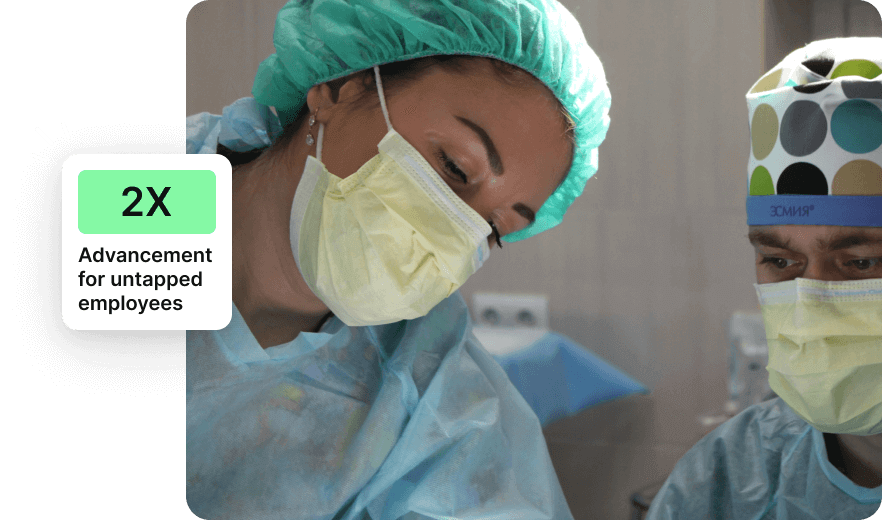🏆 How HCLTech Scaled Upskilling & Increased Retention 15% with Mentoring Read Case Study
How One Major Hospital Charts Leadership Development through Employee Mentoring

The Challenge
- Segment: Large Non-profit
- Industry: Healthcare
- Location: Texas
A large U.S. academic hospital was looking for a way to promote retention and employee growth, while also integration among its top talent. With an employee base that includes clinicians, researchers and administrative staff, the organization knew it would need a people-centric approach to scale across the entire employee population.
“In an organization this size, it’s easy to feel isolated now that we’ve transformed how we work. Some people are on site, some people are hybrid and some people are totally remote,” said the global mentoring admin and a leadership practitioner. “It can be a challenge for employees to build those connections and relationships that become necessary when they want to change to another department or improve their role in their current position.”
The mentoring program started in 2011 in response to the annual employee survey that showed staffers were interested in being mentored but didn’t have access to any formal opportunities for this type of connection. After an informal start, the program launched an in-house platform developed by the hospital’s IT team to run the program that focused on and facilitated mentor-mentee matching.
Eventually, the limitations of the tool restricted the team’s ability to expand the scope and measurement of its six programs. Program admins had to ask themselves: Are they spending more time trying to get what they wanted out of the platform than actually improving the mentoring program and the employee experience?
Objective
The hospital’s talent goal is to support the leadership development journey of their employees, regardless of where they are in their careers. Mentoring and coaching are a large part of that effort to help employees connect and grow in their career paths, whether they’re managers or individual contributors.
In fact, all leaders are required to have a formal mentoring relationship outside of their department for their performance reviews.
Further, the organization sees mentoring as a tool to break down remote work barriers, as well as foster robust networks to help employees grow professionally. Employees have different needs. Mentoring is an agile way for the company to keep employees engaged and show they care about the development of their knowledge and skill sets.
The hospital’s existing programs were designed to address the needs of its workforce. These include:
- Peer-to-Peer Leadership Program for aspiring senior-level leaders. Emphasizes organizational framework, competency development, mentoring circles, and experiential exercises.
- One-to-One Mentoring Program focused on career development and inclusive onboarding.
- Mentoring Circles Program focused on gender equality and representation.
- Peer-to-Peer Mentoring Program experience for individual contributors with an interest in moving into a formal leadership role. This program focuses on group leadership development.
- Peer-to-Peer Mentoring Program experience for administrative and faculty leaders, in roles such as director or chair, that focuses on group leadership development.
- Group Mentoring Circles with up to 10 topics. Current circle topic examples include Wellness and Resiliency and Executive Presence and Visibility.
When the mentorship program became part of the organization’s newly developed leadership initiative in 2018, the team quickly realized continuing to use the old software just wouldn’t cut it. They opted to find a new technology option, overall upgrading ease of use and program adaptability.
The Solution
The goal was to make mentoring accessible for all employees by offering better access to
the programs already in place, and by establishing varying mentoring formats and matching styles based on program needs and employee wants. The Chronus mentoring platform offered a robust and substantial toolset that provided:
- Ability to personalize the mentor/mentee experience
- Insight into program health, growth and performance
With the help of Chronus, the institution was able to scale its existing programs to benefit more participants. The software enabled the organization to revamp its participant training and mentor/mentee courses, as well as customize and develop new initiatives as needed. It also supported global governance and deep data analysis for individual programs.
I have encouraged my coworkers to join the mentoring program as mentees. This program shows initiative and helps mentees map out a career here.
– Mentee
Customizable Matching
The hospital’s mentoring program uses a competency model to easily and speedily match participants for one-on-one mentoring. The Chronus platform allows the admins to filter and weight competencies in order to effectively match pairs.
Ease of Administration
With the mentoring platform, the program is easy to facilitate. Chronus provides a framework for mentoring connection plans that keep matched pairs on track, aligning their participation and tasks with overall goals. In addition, administrators can create their own resources for connection plans, seeing major results with minimal time investment.
The global admin noted her team spends about five to 10 hours a week in the platform-tweaking variables, updating programs and customizing announcements and email campaigns.
Data Reporting & Analysis
The hospital uses surveys to gather feedback from participants and measure the effectiveness of their mentoring programs. Chronus mentoring software enables deep analysis of feedback across the organization and within individual programs through dashboards and reports. Administrators can configure these features to pull stats quickly, making it easy to assess and showcase mentoring impact at the organization.
For example, they’re able to see things like active users vs. those with unpublished profiles or individual program match rates quickly and easily.
My mentee is very motivated; she takes the initiative to learn and seeks opportunities to grow. It has been a very enriching and
rewarding relationship.
– Mentee
Impact
With the help of the Chronus mentoring platform, the hospital has expanded from a few hundred mentors to around 1,500, while tracking positive impact on retention, employee development and inclusion metrics along the way.
17%
Participants More Likely To Have a Change In Department
85%
Satisfaction Rate
440
Employee Turnovers Avoided
89%
Retention Rate (vs 74% for Non-Participants)
29%
Engagements Across Gender
2X
Advancement for Underrepresented Participants
63%
Engagements Across Ethnicity
88%
Retention Rate for Underrepresented Participants (vs 74% for Underrepresented Non-Participants)
Why Global Organizations Choose Chronus
Leading enterprises turn to Chronus for its powerful, scalable platform to address key workplace challenges like disengagement, turnover and disconnected teams, especially in remote and hybrid environments. Chronus mentoring software enables organizations to leverage mentoring and employee communities to create meaningful connections, enhance engagement and promote continuous learning.
With its simplicity, strong security protocols and proven scalability, Chronus helps companies efficiently manage and grow programs that drive retention, productivity and collaboration. Trusted by brands like Amazon, LVMH, ExxonMobil, T-Mobile, Harvard University and Paychex, Chronus breaks down silos and builds a culture of development and connection, ensuring employees are engaged and supported. For organizations looking to nurture talent and stay competitive, Chronus is the solution.
Ready to Maximize Your Mentorship Program?
Drive 50% Higher Engagement and Transform Your Mentorship Program with Chronus.
